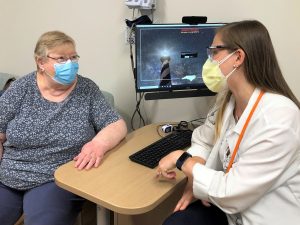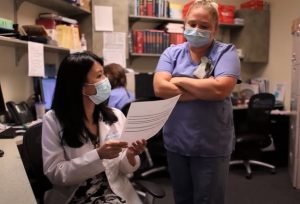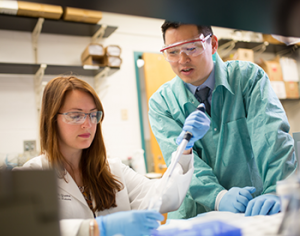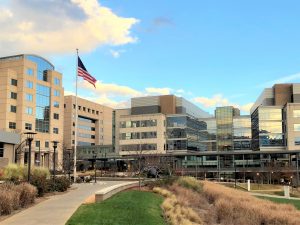Curriculum and Training
Advanced, Comprehensive Instruction to Prepare You For Any Career Path
Providing an Ideal Blend of Patient Care, Didactics, and Mentored Research
Patient CareAt the University of North Carolina, Allergy and Immunology clinical training goes beyond simply learning the fundamentals of allergy and immunology diseases. The philosophy of our faculty is to consider each patient as unique and to focus on what makes that particular patient different from the usual presentations. To this end, we encourage seeking out the latest medical literature and “thinking outside the box,” to provide what our patients have come to expect from UNC allergy and immunology: patient-centric, high quality, cutting edge clinical care.
each patient as unique and to focus on what makes that particular patient different from the usual presentations. To this end, we encourage seeking out the latest medical literature and “thinking outside the box,” to provide what our patients have come to expect from UNC allergy and immunology: patient-centric, high quality, cutting edge clinical care.
To best develop this approach to clinical care, fellows learn clinical aspects of Allergy and Immunology in two formats. Within a traditional ‘attending clinic,‘ fellows work side-by-side with our diverse faculty discovering the various possible approaches to different allergy and immunology disease. With our unique ‘continuity clinic,’ fellows then have the opportunity to put this knowledge to direct use through the care of their own cohorts of adult and pediatrics patients that they follow throughout their training. It is the ownership that comes with having your own patients that we believe is essential for each fellow to develop their own style of clinical care that they will take with them into their future careers.
As one of the largest referral centers in the Southeast, our fellows are exposed to a broad range of cases from across the state and throughout our region. In addition, we strongly believe that our fellows should be equally proficient in providing care across the age spectrum. To achieve this, our clinical training is designed to be balanced 50/50 across adult and pediatric experiences. Finally, the unique patient populations at each of our 4 outpatient sites as well as inpatient consultations at UNC Hospitals provides experience across a range of patients in terms of age, race and ethnicity, education and socio-economic backgrounds that is essential in learning to provide patient-centric care.
 The fellowship program includes five practice settings:
The fellowship program includes five practice settings:
- UNC Allergy and Immunology Clinic at the New UNC Eastowne Medical Office Building
- UNC Children’s Primary and Specialty Care at Carolina Pointe II
- UNC Children’s Allergy & Immunology at Raleigh
- UNC Specialty Care at Sanford
- Inpatient Consultations at UNC Hospitals
In addition to the core Allergy and Immunology training, fellows are encouraged to pursue additional learning opportunities through established electives in Rheumatology, Otolaryngology, Dermatology, Infectious Diseases and Pulmonology. Because of the considerable clinical overlap that Allergy and Immunology can have with other specialties, these electives broaden the fellow’s understanding of the complexities of the immune system, further preparing them to be experts in all aspects of Allergy and Immunology.

Didactic training provides the foundation upon which clinical reasoning is applied. Since its inception, the UNC Allergy and Immunology Fellowship Program has maintained its strong emphasis on formal learning through a weekly, dedicated “didactic day” that is protected from clinical responsibilities.
Learning opportunities include:
- Allergy and Immunology “Boot Camp”
- Topic-Based Journal Club
- Allergy and Immunology Case Conferences
- Clinical and Basic Immunology Board Review
- Rheumatology, Allergy & Immunology Grand Rounds
- Internal Medicine and Pediatric Grand Rounds
All fellows are encouraged to attend and participate in scientific conferences to supplement their learning and to showcase their work. The fellowship program provides coverage of clinical duties so all fellows are able to attend the American Academy of Allergy, Asthma & Immunology (AAAAI) meeting each spring. In addition, UNC fellows have routinely presented their work at the annual American College of Allergy, Asthma and Immunology (ACAAI) meeting; the Clinical Immunology Society’s Primary Immunodeficiency Diseases (CIS PID) summer school; the Aspen Allergy conference; the Southeastern Allergy Asthma & Immunology society (SEAAI) conference; and the Regional, State and Local (RSL) meeting of the NC Society of Asthma, Allergy and Immunology.

A “Core” 2-year (Clinical + Research) program, and for some participants an optional 3rd year of advanced training in research.
One reason the UNC Allergy and Immunology Fellowship Program is considered one of the best in the United States is its strong emphasis on research training. Experience has shown that the skills acquired during the design and implementation of a research project provides graduates with a mindset that enables them to approach medicine in a systematic, yet creative and out-of-the box manner that yields optimal outcomes. These skills translate into tangible benefits that prepare our fellows to pursue any of a variety of career paths including private clinical practice, academic clinical practice, research, and pharma/industry.
As part of their ACGME-accredited training, all UNC Allergy and Immunology fellows follow a comprehensive 2-year training program, with the second year focused on the development and implementation of an independent research project. For those fellows demonstrating the desire and skills to pursue a career as a research scientist in Allergy and Immunology, funding is available for an additional year dedicated to research.
Fellows are connected with faculty advisors from the moment they arrive at UNC. This eases the transition into their fellowships and helps to begin the discussion about potential career paths. Over the first year, fellows craft Individual Development Plans (IDPs) with their advisors to ensure they get the most out of their training, and to best position themselves for pursuing future employment in fields that are of interest to them. Typical goals for a standard 2-year fellow would include 1-2 publications, 1-2 local presentations, and 1-2 national presentations. For those pursuing a third year of training, the goals would be the further refinement of the research project to obtain pilot data and additional publication and presentation opportunities – moving the fellow towards the ultimate goal of applying for independent research funding.
Potential sources of third year research funding include:
- An Allergy/Immunology-specific T32 training grant
- Other T32 training grants within UNC (toxicology, pharmacology, etc.)
- Research grants through individual investigators
- Clinical funds
 A broad range of research opportunities within allergy and immunology as well as in related specialties, including but not limited to:
A broad range of research opportunities within allergy and immunology as well as in related specialties, including but not limited to:
- Environmental asthma through the Center for Environmental Medicine, Asthma and Lung Biology (CEMALB)
- Food allergy, through the UNC Food Allergy Initiative (UNC FAI)
- Delayed anaphylaxis to mammalian meat (Alpha-Gal)
- Drug allergy
- Clinical trials through the Children’s Research Institute
- Eosinophilic esophagitis with UNC Gastroenterology
To further supplement research training, audited and degree-program course work is available through the UNC Department of Pediatrics fellowship curriculum, the North Carolina Translational and Clinical Sciences Institute (NC TraCS), and the UNC Gillings School of Global Public Health.
One of the many uniquely valuable – and popular – educational options for fellows is the opportunity to join and participate as an educational leader in the “UNC Academy of Educators.”
This robust, formal education training curriculum is designed to emphasize teaching excellence in faculty and fellows, while promoting curricular innovation. Participants enjoy many types of opportunities for peer-to-peer leadership and teaching, and additional networking opportunities.
There are currently over 380 Faculty, Fellow and Resident members participating in the UNC Academy of Educators program.
The Academy offers numerous academic program components as well as four core committees:
- Scholarship
- Programming
- Awards
- Membership
“Balanced training across the age spectrum, in outpatient and inpatient settings, and in your own panel of pediatric and adult patients to follow? Check. A cadre of supportive faculty mentors with deep and diverse expertise across allergy and immunology who are invested in your learning? Check. An intentional, yet flexible, programmatic approach to develop your investigative and scholarly curiosity? Check. UNC has everything for a trainee to grow into a skilled and confident allergist-immunologist right out of fellowship. With my UNC experience as the foundation, I was well-prepared to step into my first junior faculty position.”
–Edward Iglesia, MD, MPH, 2020 Graduate